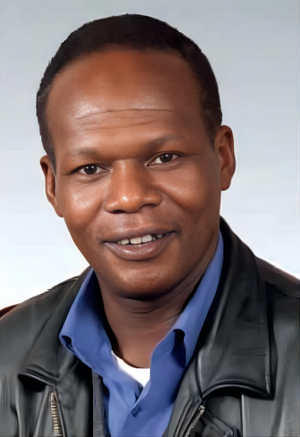Jorge Medina facts for kids
Quick facts for kids
Jorge Medina
|
|
|---|---|

Official portrait, 2014
|
|
| Member of the Chamber of Deputies from La Paz's special circumscription |
|
| In office 19 January 2010 – 18 January 2015 |
|
| Substitute | Blanca Cartagena |
| Preceded by | Seat established |
| Succeeded by | Alicia Natte |
| Personal details | |
| Born |
Jorge Medina Barra
24 April 1968 Chijchipa, La Paz, Bolivia |
| Died | 23 November 2022 (aged 54) La Paz, Bolivia |
| Political party | Movement for Socialism |
| Alma mater |
|
| Occupation |
|
Jorge Medina Barra (born 24 April 1968 – died 23 November 2022) was an important Bolivian civil rights activist and politician. He worked hard to make sure Afro-Bolivians were recognized and treated fairly.
Medina served as a member of the Chamber of Deputies for the La Paz region from 2010 to 2015. He was the first Afro-Bolivian person to be part of Bolivia's national law-making body, the Legislative Assembly.
Contents
Early Life and Education
Jorge Medina was born on 24 April 1968. His parents, Paulino Medina and Sergia Barra, were an Afro-Bolivian family. They lived in a small farming community called Chijchipa in the La Paz Department.
He went to primary school in a nearby town called Tocaña. Later, his family moved to Caranavi, where he finished high school in 1988. After that, Medina moved to the big city of La Paz to go to college.
In La Paz, he studied business administration at the Higher University of San Andrés. He also took classes in systems engineering at the University of Aquinas. Before becoming a politician, Medina worked many different jobs. He was a chauffeur, a mechanic, and even worked for a paper company.
Fighting for Afro-Bolivian Rights
When Jorge Medina moved to La Paz, he noticed something important. There weren't many Afro-Bolivians in the city, and many people didn't even know they existed. Sometimes, Afro-Bolivians faced unfair treatment and even physical harassment. This made Medina want to make a difference.
He became active in the Afro-Bolivian civil rights movement in the late 1980s. He helped promote the saya, a special type of Afro-Bolivian folk music with drums. The saya helped bring attention to Afro-Bolivian culture. Medina also became a talented saya composer and performer himself.
In 1988, Medina and other activists started the Afro-Bolivian Saya Cultural Movement (MOCUSABOL). This group became one of the main organizations working for Afro-Bolivian rights and awareness. Medina served as the vice president and later the president of MOCUSABOL for five years.
However, Medina felt that people only saw Afro-Bolivians as "the Black people who dance." He wanted people to know that Afro-Bolivians could do many other things too.
In 2006, he co-founded another important group called the Afro-Bolivian Center for Integral and Community Development (CADIC). Medina became the executive director of CADIC. This organization worked hard to get the Afro-Bolivian community recognized by the government.
During the time when Bolivia was writing its new Constitution (2006–2007), CADIC played a big role. They successfully made sure that Afro-Bolivians received the same minority rights as the country's indigenous peoples. This was a huge step forward!
Becoming a Member of Parliament
After the new Constitution was written, minority groups were encouraged to join politics. Jorge Medina was asked to run for a seat in the Chamber of Deputies. He remembered thinking, "If Barack Obama can be president of the United States, why can't an Afro-Bolivian be in parliament here?"
He ran to represent a new special district in La Paz. This district was created for minority indigenous peoples, including Afro-Bolivians. Medina won with a very high number of votes, nearly 92 percent! This made him the first Afro-Bolivian in history to serve in Bolivia's national legislature.
What He Did in Parliament
As a member of parliament, Medina helped create an important law called the Law Against Racism and All Forms of Discrimination. This law, passed in 2010, aimed to stop racism and unfair treatment. It specifically recognized Afro-Bolivians as a group that needed protection.
Even though the law faced some challenges, it made people think twice before acting or speaking in a racist way. Medina believed the law's main goal was to encourage understanding, not just to punish people.
During his time in parliament, Medina continued to work for the recognition of Afro-Bolivians. He helped pass laws that celebrated Afro-Bolivian culture. For example, one law made September 23 the National Day of the Afro-Bolivian People. Another law recognized the saya as part of Bolivia's cultural heritage.
In 2012, Bolivia held a national count of its population (census). This was a big deal because it was the first time the government ever counted the Afro-Bolivian population. Medina used this information to suggest creating a special area where Afro-Bolivians would have even more say in elections, but this idea didn't happen.
After his term ended in 2015, Medina left politics. He went back to leading CADIC, the organization he helped create.
Personal Life
Jorge Medina was married to Miriam Iriondo, who was also an Afro-Bolivian saya performer. They had two children named Adin Dube and Malaika. These names are from the Swahili language and mean "strength and passion" and "angel."
Besides his work in activism and politics, Medina was also involved in radio. He hosted a talk show called Raíces Africanas (African Roots) starting in 2001. He even acted in a movie called American Visa in 2005.
Jorge Medina passed away on 23 November 2022, when he was 54 years old. Many Afro-Bolivian groups and the Chamber of Deputies remembered him and his important work.
Images for kids
See also
 In Spanish: Jorge Medina Barra para niños
In Spanish: Jorge Medina Barra para niños


